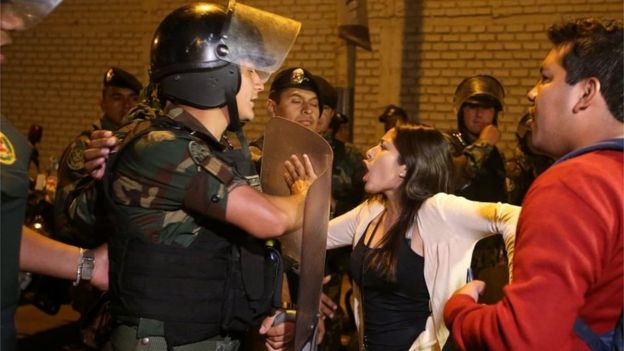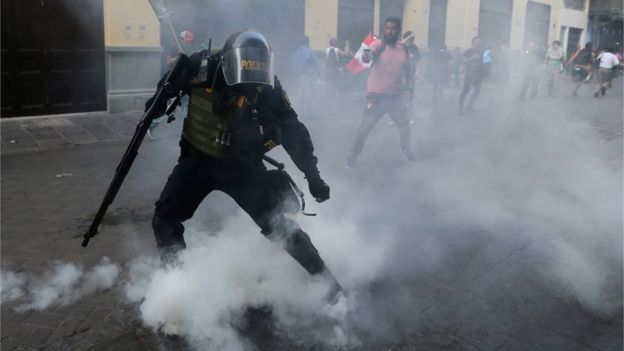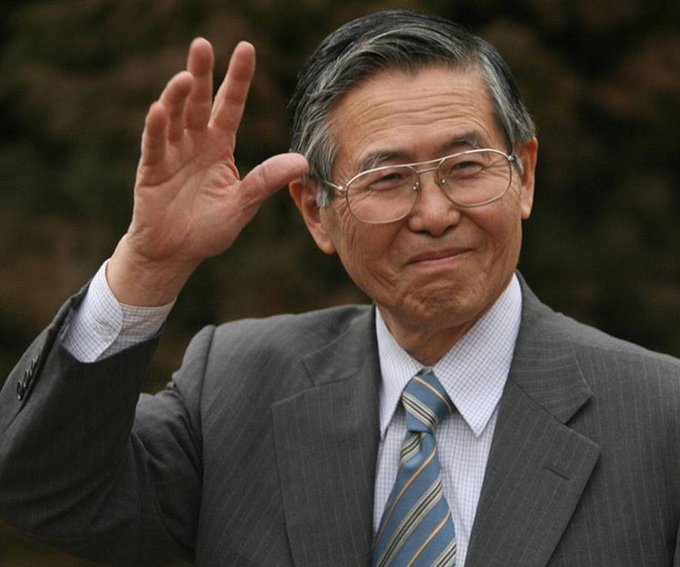Police in Peru have fired tear gas and clashed with thousands of protesters angry at the authorities' decision to pardon ex-President Alberto Fujimori.
"No to the pardon!" chanted crowds in the capital Lima, during a second day of unrest that began on Christmas Eve.
President Pedro Pablo Kuczynski pardoned Fujimori on health grounds.
Mr Kuczynski acknowledged the anger at his decision but said he could not "allow Alberto Fujimori to die in prison".
Fujimori, who is serving 25 years for human rights abuses and corruption, was last week moved from jail to hospital.
The former president has low blood pressure and an irregular heartbeat.
 REUTERS
REUTERS
Mr Kuczynski denies pardoning Fujimori as part of a deal with his party last week to avoid his own impeachment, for allegedly receiving illegal payments from the Brazilian construction giant Odebrecht.
Two members of President Kuczynski's party in the Peruvian Congress, Vicente Zeballos and Alberto de Belaunde, have resigned in protest at the pardon.
 REUTERS
REUTERS
Meanwhile, supporters of the man who led Peru from 1990 to 2000 celebrated outside the city hospital where he was being treated.
He is admired by some Peruvians for combating Maoist rebels - but his critics considered him a corrupt dictator.
On Monday, his son Kenji tweeted a video of himself breaking the news of the pardon to his father in his hospital bed and wishing him a Merry Christmas.
On what grounds was he pardoned?
A statement from President Kuczynski's office said he had decided to grant a "humanitarian pardon to Mr Alberto Fujimori and seven other people in similar condition", without naming the others.
Doctors, the statement added, had "determined that Mr Fujimori suffers from a progressive, degenerative and incurable illness and that prison conditions represent a grave risk to his life".
In a following statement, Mr Kuczynski said: "I am convinced that those of us who consider ourselves democrats cannot allow Alberto Fujimori to die in prison. Justice is not vengeance. All pardons are by nature controversial. There is an important number of Peruvians who are opposed [to the pardon].
"My decision is especially complex and difficult, but it is my decision. I can not only be the president of those that voted for me, I need to be it for all Peruvians."
Was a deal done?
The conservative Popular Force (FP) party, led by the former president's daughter Keiko Fujimori, controls Congress and on Thursday tried to impeach President Kuczynski over a corruption scandal.
However, her brother Kenji split the FP vote, allowing the president to stay in power and prompting the accusation that Fujimori's release had been promised in exchange.
"To save his own skin he [President Kuczynski] cut a deal with Fujimori's supporters," said leftist politician Veronika Mendoza, labelling the president's decision as treason.
What was Fujimori convicted of?
In 2007, he was sentenced to six years in jail for bribery and abuse of power, but two years later was sentenced to another 25 years in prison for human rights abuses committed during his time in office.
He was convicted of authorising killings carried out by death squads.
Protests erupted soon after news of the pardon came to light on Sunday, with many demonstrators waving pictures of victims of the counter-insurgency campaign.
"We believe the pardon was carried out in an illegal manner," one unnamed protester told Reuters. "The medical report that supposedly sanctioned this was a fraud. The reality is that this sadly was a political agreement between the Fujimorists and the current government."
Jose Miguel Vivanco, executive director of Human Rights Watch in the Americas, tweeted: "I regret Fujimori's humanitarian pardon.
"Instead of reaffirming that in a state of law there is no special treatment for anyone, the idea that his liberation was a vulgar political negotiation in exchange for Pedro Pablo Kuczynski maintaining power will remain forever."





0 Primjedbe